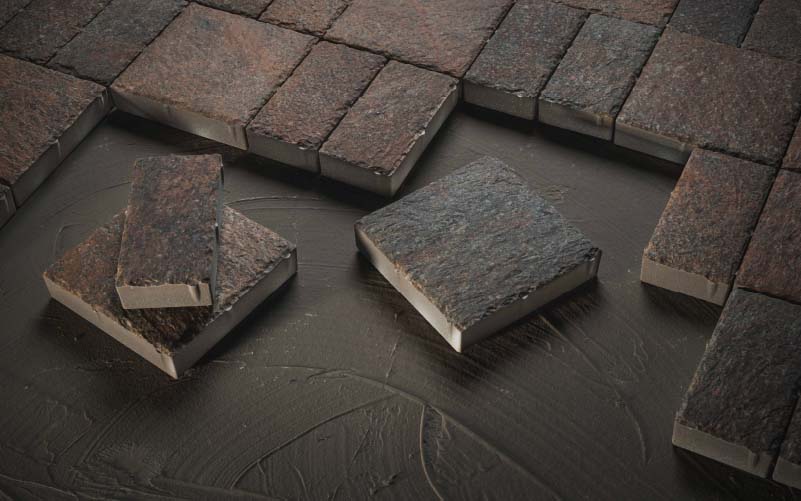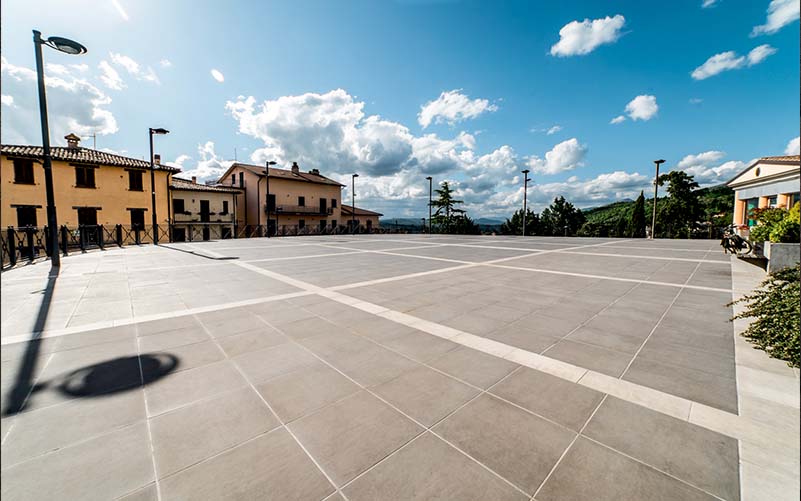The urban layout of our cities requires actions that increasingly curb climate change.
In this respect, sustainable road pavings offer numerous advantages:
1. reduced impact on existing natural settings
2. greater resistance
3. resistance to instabilities
4. improved drainage
5. high technical and mechanical performance.
But what are the road paving solutions that ensure these results while promoting sustainability?
Latest generation road pavings: sustainable, resistant and with new thicknesses
It is now clear that traditional asphalt, concrete or natural stone road surfaces are no longer sustainable.
Nor it is conceivable to use other perishable solutions that require constant maintenance, the opening of construction sites, and the movement of vehicles and earth-moving equipment, with the consequent rise in CO2 emissions.
The latest generation of road paving thus starts up again from nature, using the world's oldest material: clay.
Thanks to the innovations in the field of construction material science, this element is not taken from the environment from scratch, but is conveyed through productive regeneration processes, as well taught by the circular economy system.
This leads to enhance the uses of porcelain stoneware for eco-friendly and super durable road pavings.
Whereas in the past porcelain stoneware was not considered for high-strength outdoor urban applications, now the performance and reliability of this material have completely changed the scenario.
Not only has the improvement in the 'manufacturing' process made a difference, but also the new awareness of the drainage capacity provided by the surfaces with a thickness ranging from 5 to 6.5 cm.
Concrete road pavings are manufactured with 15 cm thicknesses.
This is not an ideal choice because:- the greater the thickness, the lower the elasticity of the surface
- the soil's capacity to withstand bumps is nullified
- thermal expansion and the resulting density variations are exacerbated, causing more frequent cracking.
- proper drainage
- better load distribution and greater stability, as the driveway/walking surface is not affected by continuous stresses
- resistance to extreme weather conditions and treatments
Why choosing green road pavings
In addition to the above, there are further reasons why green road surfaces are necessary.
The architect-designer who has to redevelop the streets and squares of urban centers is aware that his or her choices will also have implications in terms of:- energy
- aesthetic appeal
- economy
Regarding the energetic aspects, it is important to consider the parameters of UV resistance.
From this point of view, sustainable porcelain stoneware road paving is not affected by the action of these rays, unlike other materials such as cement.
In terms of aesthetics, the extreme variety of thicknesses, sizes and colors of porcelain stoneware eco-stones provides a solution to a significant problem for architects-designers: that of finding versatile solutions, adaptable to the various projects they undertake. The contexts are always different and there is the need for as much diversification as possible. Thanks to technology, all this is a reality.
Lastly, as far as the economic aspect is concerned, it is important to remember that natural stone paving has very high costs. The material is extracted from quarries, there are high costs for transport, manufacturing, as well as a serious waste of resources.
The same applies to asphalt and concrete, where the initial 'low' investment is then weighed down by extensive maintenance, which in the final analysis increases the outlay considerably.
Eco-stones, on the other hand, are not only environmentally friendly, but have much lower costs.
Grestone® Urban Pavings: eco-stones for sustainable road pavings
And the good, old sanpietrini as we know them, what will happen to them?
There is already an absolutely faultless alternative in terms of aesthetics, quality and performance.
Among all eco-friendly surfaces, eco-stones mirror the characteristics of natural stone in every way, while enhancing its performance. They are the ideal solution to enhance the aesthetic appearance of busy streets or to maintain the beauty of our historical centres, while allowing for high levels of road safety.
Grestone® eco-stones have all the characteristics for making sustainable road pavings , while respecting the principles of the circular economy.
In addition, Grestone® Urban Pavings has devised a system of self-locking porcelain stoneware paving slabs that considerably reduces laying times: a glimpse into the future of the redevelopment of streets and squares in urban centres, with construction sites that can count on halved timing compared to other options on the market.
Grestone® outdoor pavings has been developed to:
- meet the need for sustainability in Urban Design and Outdoor Living projects
- minimise maintenance, with long-lasting applications that are highly resistant to loads and bumps.
- increase technical performance in relation to climatic and chemical changes: all Grestone® Urban Pavngs products are frost-proof, resistant to de-icing salts and additives, non-absorbent and slip-proof.
The Grestone® Urban Pavings product line has been specifically designed for road paving and for covering squares and driveways, with thicknesses ranging from 5 cm to 6.5 cm.
Planning your next Urban Design project?
You can create street paving in cities or small towns with technologically advanced materials: in tune with nature, more resistant to disruption and with optimal drainage, less polluting.



